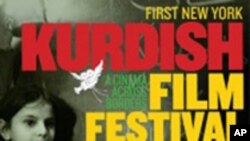Organizers call it "a cinema across borders," the first-ever festival of Kurdish film in the United States. The films chosen for the five-day event at New York University focused on a people widely dispersed, from those who still live in traditionally Kurdish areas in the Middle East, to Europe and North America. Across sometimes impassable barriers, they keep alive a shared language and cultural identity.
That struggle is both mirrored and sustained by a burgeoning Kurdish cinema, according to Sally Eberhardt, a director of the festival. She said organizers were confronted with a wealth of good films, but had slots for only nine full-length films and ten shorts.
“Choosing was incredibly difficult,” she said. “We were primarily limiting ourselves to films from the last few years, but even in doing that, there were so many films to watch. There’s no shortage of amazing Kurdish film out there."
Yol, which won the top prize at the Cannes Film Festival in 1982, was chosen to represent the rich history of Kurdish cinema. The story of five Kurdish prisoners in Turkey, it was written and directed by the late Yilmaz Güney when he himself was in prison. His assistant, ?erif Gören, shot the film based on the director's notes smuggled out of prison.
Eberhardt says festival organizers screened films from all the regions where Kurds now live, their culture threatened by borders, war, repression or sheer distance. The Kurds' traditional homeland, called Kurdistan, touches on parts of Turkey, Syria, Iraq, Iran and Armenia, but Kurdish communities now can be found in many other countries, too.
Sadness at the loss of home, or separation from other Kurdish people and culture, pervades many of the films chosen for the event. "Bawke," for example, by Hisham Zaman, is about a Kurdish father of a young son who faces being deported from Norway, their latest hope for refuge in a seemingly endless journey. He pretends not to know his son after he is arrested, so that the boy will be able to remain behind and have a better life.
"The theme of borders seems to go through a lot of the films,” Eberhardt said, “and the divisions between the Kurds that happen by no fault of their own, through borders that were established decades ago, that they have had to live with ever since."
Half Moon, by Bahman Ghobadi, was the one film that is explicitly about borders. It follows the journey of Kurdish musicians living in Iran who travel to Iraq to celebrate the end of Saddam Hussein's rule, and new openness for Kurdish music. "In weaving their way from Iran through Turkey into Iraq,” Eberhardt said, “it becomes this brilliant metaphor for how can it be that people who were once united now have to take this torturous path to go from one section of where they live, to another section of where they live."
Eberhardt noted that prejudice against Kurds and repression of their language and culture continue in some countries. The Storm, by Kazim Öz, which made its U.S. premiere at the festival, is about an apolitical young man who leaves his village in southern Turkey in the early 1990s to attend university in Istanbul. There he experiences government-backed violence against Kurdish activists, and is radicalized. "He witnesses what's happening in Istanbul, and the repression that's starting to mount there,” Eberhardt said. “He makes this really serious journey within the film."
Films by and about Kurdish women were another theme of the festival. In Dengbej Women, by the Women’s Collective of Atölyemor/Filmmor Women’s Cooperative, female dengbej, or traditional Kurdish bards, tell their stories, and sing their sad music. For many, a life in music still means rejection by their families.
A dark comedy, Vodka Lemon, by Hiner Saleem, closed the festival. Set in a wintry mountain village in Armenia, it tells the story of a widower who, during visits to his wife’s gravesite, happens to meet and fall in love with a much younger widow. She is also a barmaid who serves up the drink of the title in a little shack in the snowy landscape.
The festival also featured a rare panel discussion among five Kurdish filmmakers from around the world, including Saleem, Ghobadi, Öz, Zaman and Jano Rosebiani, who made the feature film, Jiyan, about the aftermath of the 1988 gas attack on the Iraqi Kurdish town of Halabja.





